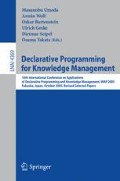Abstract
RoughNon-deterministicInformation Analysis (RNIA) is a framework for handling rough sets based concepts, which are defined in not only DISs (DeterministicInformation Systems) but also NISs (Non-deterministicInformation Systems), on computers. RNIA is also recognized as a framework of data mining from uncertain tables. This paper focuses on programs in prolog, and briefly surveys a software tool for RNIA.
Access this chapter
Tax calculation will be finalised at checkout
Purchases are for personal use only
Preview
Unable to display preview. Download preview PDF.
References
Pawlak, Z.: Rough Sets: Theoretical Aspects of Reasoning about Data. Kluwer Academic Publishers, Dordrecht (1991)
Pawlak, Z.: Some Issues on Rough Sets. Transactions on Rough Sets, Int’l. Rough Set Society 1, 1–58 (2004)
Komorowski, J., Pawlak, Z., Polkowski, L., Skowron, A.: Rough Sets: a tutorial. In: Rough Fuzzy Hybridization, pp. 3–98. Springer, Heidelberg (1999)
Nakamura, A., Tsumoto, S., Tanaka, H., Kobayashi, S.: Rough Set Theory and Its Applications. Journal of Japanese Society for AI 11(2), 209–215 (1996)
Polkowski, L., Skowron, A. (eds.): Rough Sets in Knowledge Discovery 1. Studies in Fuzziness and Soft Computing, vol. 18. Physica-Verlag (1998)
Polkowski, L., Skowron, A. (eds.): Rough Sets in Knowledge Discovery 2. Studies in Fuzziness and Soft Computing, vol. 19. Physica-Verlag (1998)
Grzymala-Busse, J.: A New Version of the Rule Induction System LERS. Fundamenta Informaticae 31, 27–39 (1997)
Tsumoto, S.: Knowledge Discovery in Clinical Databases and Evaluation of Discovered Knowledge in Outpatient Clinic. Information Sciences 124, 125–137 (2000)
Rough Set Software. Bulletin of Int’l. Rough Set Society 2, 15–46 (1998)
Orłowska, E., Pawlak, Z.: Representation of Nondeterministic Information. Theoretical Computer Science 29, 27–39 (1984)
Orłowska, E. (ed.): Incomplete Information: Rough Set Analysis. Physica-Verlag (1998)
Demri, S., Orłowska, E.: Incomplete Information: Structure, Inference, Complexity, Monographs in Theoretical Computer Science. Springer, Heidelberg (2002)
Lipski, W.: On Semantic Issues Connected with Incomplete Information Data Base. ACM Trans. DBS 4, 269–296 (1979)
Lipski, W.: On Databases with Incomplete Information. Journal of the ACM 28, 41–70 (1981)
Nakamura, A.: A Rough Logic based on Incomplete Information and Its Application. Int’l. Journal of Approximate Reasoning 15, 367–378 (1996)
Kryszkiewicz, M.: Rules in Incomplete Information Systems. Information Sciences 113, 271–292 (1999)
Nakata, M., Miyamoto, S.: Databases with Non-deterministic Information. Bulletin of Int’l. Rough Set Society 7, 15–21 (2003)
Sakai, H., Okuma, A.: An Algorithm for Finding Equivalence Relations from Tables with Non-deterministic Information. In: Zhong, N., Skowron, A., Ohsuga, S. (eds.) RSFDGrC 1999. LNCS, vol. 1711, pp. 64–73. Springer, Heidelberg (1999)
Sakai, H.: Effective Procedures for Handling Possible Equivalence Relations in Non-deterministic Information Systems. Fundamenta Informaticae 48, 343–362 (2001)
Sakai, H.: Effective Procedures for Data Dependencies in Information Systems. In: Rough Set Theory and Granular Computing. Studies in Fuzziness and Soft Computing, vol. 125, pp. 167–176. Springer, Heidelberg (2003)
Sakai, H., Okuma, A.: Basic Algorithms and Tools for Rough Non-deterministic Information Analysis. Transactions on Rough Sets, Int’l. Rough Set Society 1, 209–231 (2004)
Sakai, H., Nakata, M.: Discernibility Functions and Minimal Rules in Non-deterministic Information Systems. In: Ślęzak, D., Wang, G., Szczuka, M.S., Düntsch, I., Yao, Y. (eds.) RSFDGrC 2005. LNCS (LNAI), vol. 3641, pp. 254–264. Springer, Heidelberg (2005)
Skowron, A., Rauszer, C.: The Discernibility Matrices and Functions in Information Systems. In: Intelligent Decision Support - Handbook of Advances and Applications of the Rough Set Theory, pp. 331–362. Kluwer Academic Publishers, Dordrecht (1992)
Author information
Authors and Affiliations
Editor information
Editors and Affiliations
Rights and permissions
Copyright information
© 2006 Springer-Verlag Berlin Heidelberg
About this paper
Cite this paper
Sakai, H. (2006). On a Rough Sets Based Data Mining Tool in Prolog: An Overview. In: Umeda, M., Wolf, A., Bartenstein, O., Geske, U., Seipel, D., Takata, O. (eds) Declarative Programming for Knowledge Management. INAP 2005. Lecture Notes in Computer Science(), vol 4369. Springer, Berlin, Heidelberg. https://doi.org/10.1007/11963578_5
Download citation
DOI: https://doi.org/10.1007/11963578_5
Publisher Name: Springer, Berlin, Heidelberg
Print ISBN: 978-3-540-69233-1
Online ISBN: 978-3-540-69234-8
eBook Packages: Computer ScienceComputer Science (R0)

